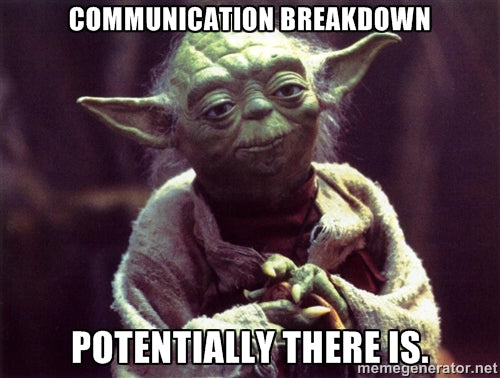That loving feeling.
It’s hard to find and hold onto with the right agency partner.
Some client-agency pairings blossom into meaningful relationships. But with so many new business challenges and priorities piling up, it’s easy to lose sight of why your businesses got together in the first place.
Will your collaboration be a match made in heaven, or was it doomed to fail from the start?
Let’s examine the keywords you need to cherish to set-up your partnership for success.
1. It all Begins with One Five Letter Word
 TRUST. It sounds simple enough but how do you establish it early on?
TRUST. It sounds simple enough but how do you establish it early on?
Your business is your baby. Entrusting its public image and user experience to a stranger can be a scary thought. Plus, you’re going to have to pay these people with your hard earned money.
Need peace of mind?
If you’ve selected an agency vetted by the Shopify team and listed on the experts marketplace, you can trust that they know a thing or two about ecommerce, design and developing websites. So, you’re already in good hands.
Once you’ve played the field and found the agency of your dreams, it’s time to make a long-term commitment. Before you do, make sure you know what makes each other tick.
“When kicking off a new project, all key agency and client stakeholders need to be a part of the process from the beginning. Otherwise, it will cost you time and money later,” says James Corr, Growth Consultant at Only Growth – a Shopify agency partner that offers ecommerce website design, development, optimization, PPC and email marketing, and growth hacking services.
No one likes to begin a relationship based on text messages and emails. That’s why it’s helpful to start with a face-to-face meeting (even if it’s over Skype or Google Hangouts) with all stakeholders to hash out your key project deliverables.
“We host a sales call to take notes, gather intellectual property (IP), and provide direction on the general approach. That way, our clients know we’re taking them seriously and want to understand their objectives. It’s also a good way to meet each other and build rapport,” says Chris Pointer, Founder & Creative Director at Pointer Creative – a Shopify agency partner that offers services such as ecommerce website consulting, design, development and replatforming to Shopify.
Signing the Prenup (or Statement of Work)

Just like asking for a prenuptial agreement, you should get everything in writing to protect both parties before the project begins.
After the brainstorm, your agency should draft a statement of work (SOW) to ensure all stakeholders and key decision makers understand and agree on exactly what the objective and scope is for your first project together. This document should outline all of the major milestones, deliverables, and timelines required.
Ever start dating someone who seemed easy going but then later turned out to be super demanding? Your agency just wants to get all of your needs on the table before they can quote you accurately.
“A new component that wasn’t in the SOW may sound like a small task but could cost a lot more to customize and delay a project,” explains Chris. “That’s why we try to be as precise as possible with the SOW.”
Once your team has reviewed the SOW in detail and resolved any questions you may have, then it’s time to talk final numbers.
Don’t be shocked if the quote is different from the ballpark number that they gave you before the SOW. Without all of the project details, it’s difficult to properly estimate costs.
By doing a lot of this work up front, you’ll ensure that everyone is on the same page and trusts each other. The SOW document will also serve you both well if your business marriage ever ends up on the rocks.
2. Communication Is a Top Priority

Image via MemeGenerator.com
Before you sign the contract and commit, make sure to discuss any baggage you have from previous relationships. If you’ve been burned by an agency or developers before, explain why it didn’t work, so the agency doesn’t make the same mistakes.
Also, communicate how you like to work. Want regular updates every week? Are you a phone person, email, or a text person? These details help the agency understand how to be the attentive partner that you need.
“Make sure to agree on the tools you’re going to use for the project,” adds James. “An agency should be familiar with various communication and project management tools like Slack, Trello or Asana and can adapt to your needs. But you have to let them know what you prefer to ensure a good customer experience.”
Don’t like unpleasant surprises? Then, ask the agency about the payment process before you sign the contract.
Some agencies bill by the hour, while others offer a flat fee. There are pros and cons to both. With a flat fee, you often have to pay everything up front – with the caveat that you can get a partial refund (depends on where you are in the project) if you are unsatisfied.
The benefit of this option is that you can budget appropriately for your project. Still, if demands start to go beyond the scope outlined in the SOW, you will have to pay additional charges for the agency’s extra time.
If you prefer an agency that bills by the hour, you may not have to pay everything up front. Although, most agencies will still give an estimate for the full project and ask for some up-front payment to get started. But if you get into a lot of revisions, time and money add up quickly.
“Make sure your agency isn’t hiding anything, that you are clear on the payment terms and that you have an out if the relationship just isn’t working,” says James.
3. R-E-S-P-E-C-T. Find Out What It Means to Agencies

Image via QuickMeme.com
Respect isn’t just for Aretha. Every agency wants a little bit of this as you begin your work together. “Think of us as an extension of your family; not just a service provider,” says Chris.
Both your time and the agency’s time is money. So issues can escalate quickly, and emotions run high when someone doesn’t meet the other’s expectations.
Don’t sweat the small stuff and try to see things from the agency’s perspective. “An award-winning site just doesn’t happen overnight,” says Chris. “We need to understand your product and your customers. If that’s not lined up for us, it’s hard to create the work of art you envisioned.”
It’s also important to consider that “getting it done” and “getting it done right” are two different things. By respecting the agency’s process, the outcome of your project will be much better.
As the saying goes, it takes two to tango. So, you need to hold up your end of the bargain. “If our clients take too long getting assets to us, it can sabotage the tight deadlines and milestones we’ve been hired to hit,” says Chris.
James adds that agencies want you to feel like you’re their top priority. But there needs to be boundaries. “I set aside a certain number of hours every day to be available to respond quickly to customer questions,” he says. “However, it needs to be understood that I may not reply right away outside those hours .”
4. All We Need is Just a Little Patience
 Image via Wikimedia Commons
Image via Wikimedia Commons
Are the mock-ups your agency delivered all wrong? In some cases, you may suspect that your agency is from Mars and your business is from Venus. If this is your first agency project, know that things can and will work out in the end with a little patience.
We’re all human, and everyone will make mistakes at some point. If you put your agency under a tight deadline, for example, it means that they had less time to get to know your business and understand what you’re trying to achieve.
It’s best to focus on how to resolve the issue and give your agency the chance to make things right.
In some cases, you may even want to re-think super tight timelines “if an agency (or more than one agency you approach) communicates that they’re hesitant to make a deadline,” says Chris. “You need to know what you’re getting into and how it might impact the results you desire.”
Also, trust that the agency has done a lot of similar projects before and knows what it takes to deliver great work. They want to please you and keep you as a partner, so don’t jump too quickly to the conclusion that they’re trying to screw you over. Hear them out, and you may learn something new about each other and deepen your relationship.
Final Thoughts
An agency is nobody until some client loves them. All Shopify partner agencies are passionate about ecommerce, with a strong desire to help your business grow.
Regardless, sometimes relationships lose that loving feeling for good. If you have to part ways, it’s always best to try and finish the contracted work before moving on. This approach is often the shorter path, rather than stopping halfway through and scrambling to find another agency to complete the work.
If that option isn’t possible, try to end things amicably anyhow. The industry is small, and you don’t want to get a bad rep.
Agencies can be just as gun shy about working with a new client (who they’ve heard through the grapevine is tough to deal with) as clients are about starting a new relationship with an agency that has mixed reviews.
Let us know if you have additional questions about how to make your new agency relationship more meaningful. We’re here to help.
 About The Author
About The Author
Andrea Wahbe is a freelance B2B marketing strategist and corporate storyteller who writes about Canadian SMEs, marketing, and digital media trends. Follow her on Twitter.
Read more
- B2B Ecommerce Features for Acquiring, Selling & Retaining Customers
- How to Use a What-if Analysis to Measure the Effects of Your Decisions
- What to Do After You've Lost a Loyal Customer
- Ecommerce Marketing Strategies: A Comprehensive Guide for Growth
- Direct to Consumer vs Wholesale: Customer Experience Over Competition
- Resources to Help Merchants Get Online Fast, Optimize Stores, and Scale
- Selling $3 Billion on Autopilot: Less Effort, More Growth via Ecommerce Automation
- Global Fulfillment: A Guide to Finding the Right Shipping Partner
- A Strategy for Human Resources in our Current Climate


